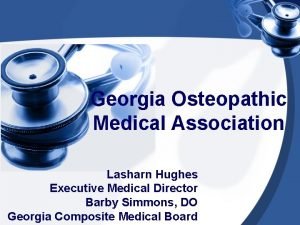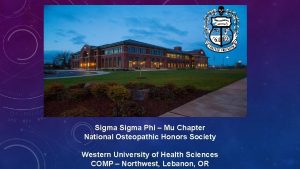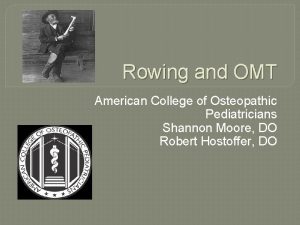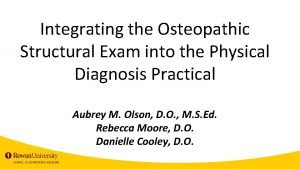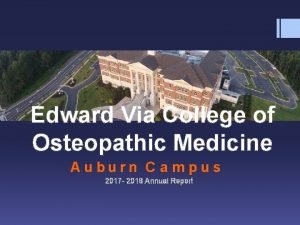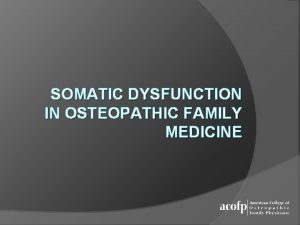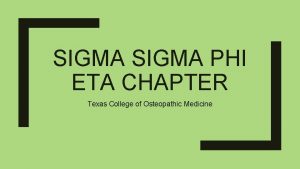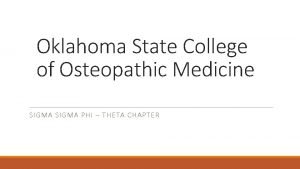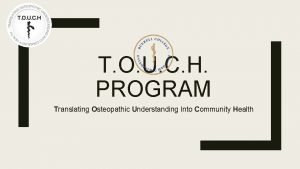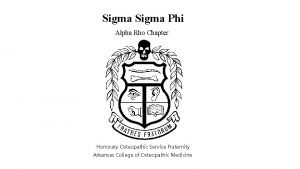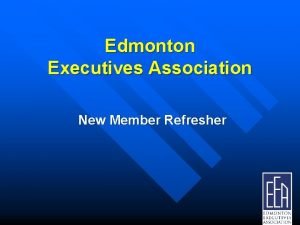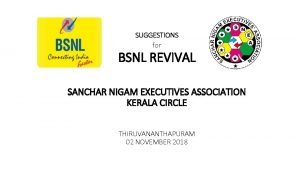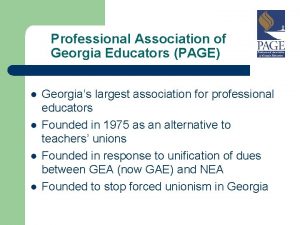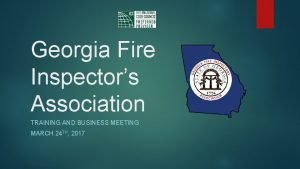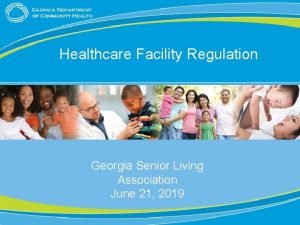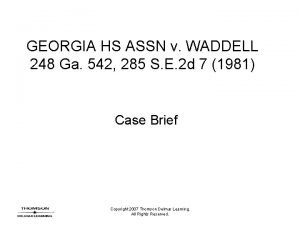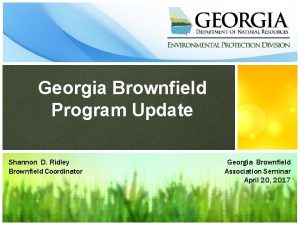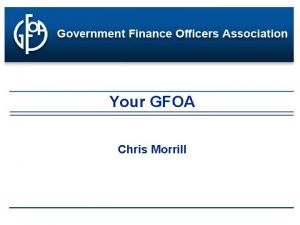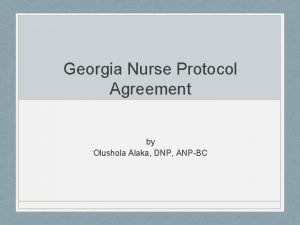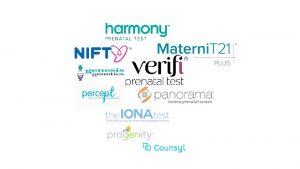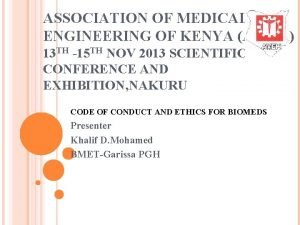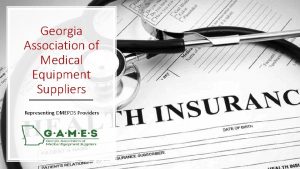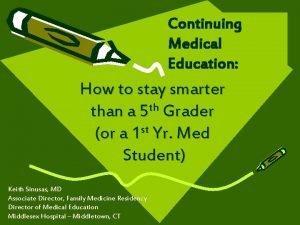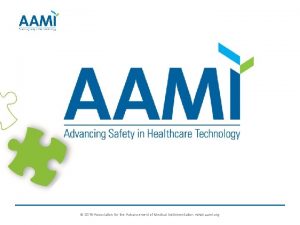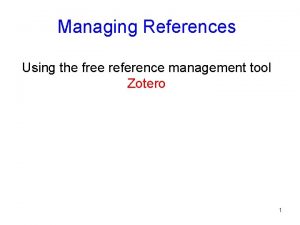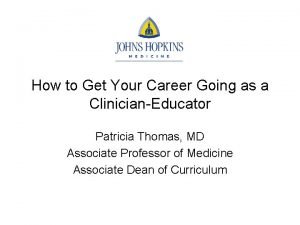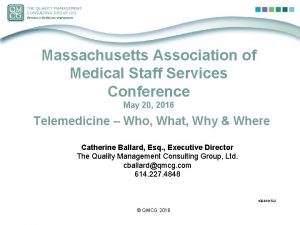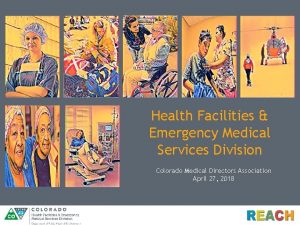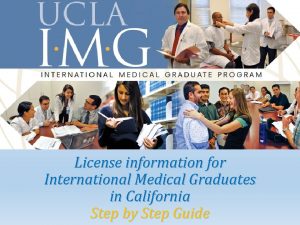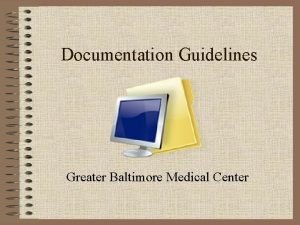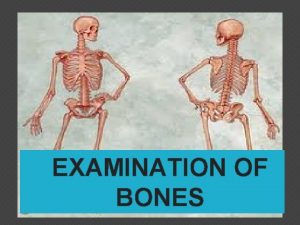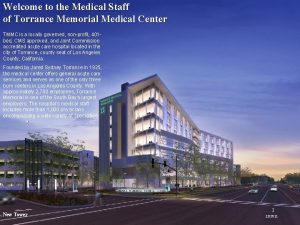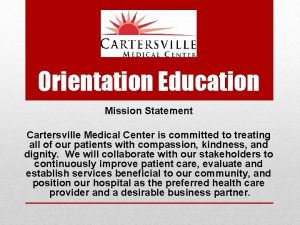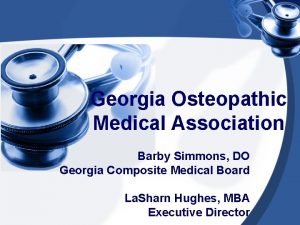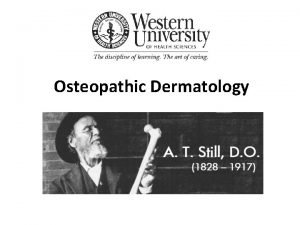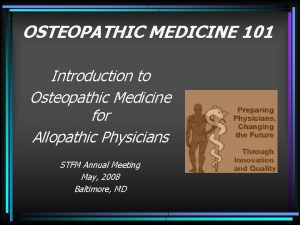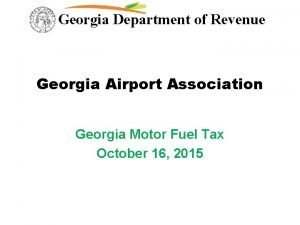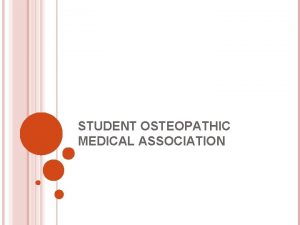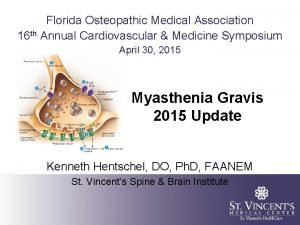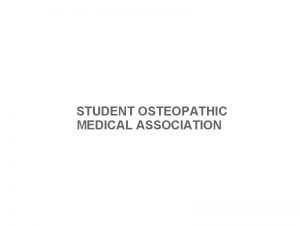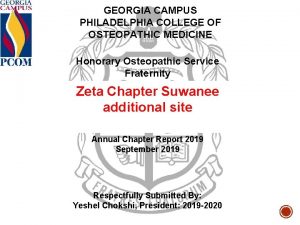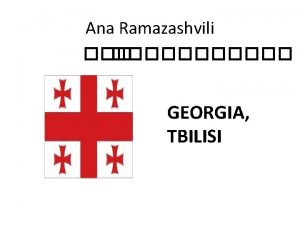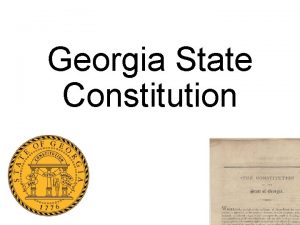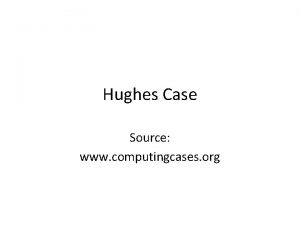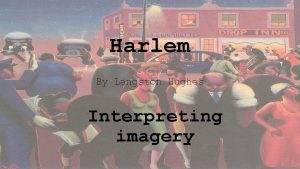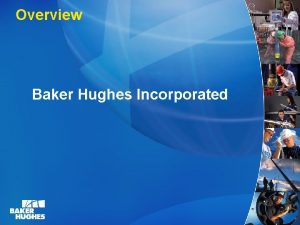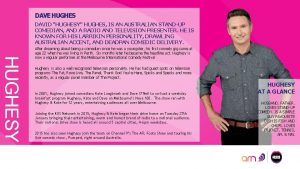Georgia Osteopathic Medical Association Lasharn Hughes Executive Medical





































- Slides: 37

Georgia Osteopathic Medical Association Lasharn Hughes Executive Medical Director Barby Simmons, DO Georgia Composite Medical Board

Composition of the Board Sixteen Board Members • 15 appointed by the Governor – Four-year terms • 13 physicians (11 MDs, 2 DOs) – Licensed and actively practicing in GA • 2 consumers – No ties to the practice of medicine • 1 physician assistant (non-voting) – Appointed by the Board

About the Board Licensing authority for 8 professions with over 50, 033 licensees as of October 1, 2017: • • Physicians, including residents Physician Assistants Respiratory Care Professionals Acupuncturists Orthotists and Prosthetists Clinical Perfusionists Cosmetic Laser Practitioners Pain Management Clinics 38, 067 4, 755 5, 582 261 227 258 777 255 • Also the approving authority for APRN prescribing protocols

Board Committees • Advisory committee for each licensed profession (and APRN prescribing protocols) – Recommends Board actions to approve or deny license applications and on other professionspecific matters • Wellness Committee – Recommends Board actions concerning impaired licensees • Investigative Committee – Recommends Board actions on enforcement matters • Rules Committee

Applying for a License Applying online is the quickest and easiest way to get licensed Go to: medicalboard. Georgia. gov Click: GCMB Online Services Submit your application online!

Applying for a License Most applications are completed within 60 days of the date the physician submits the application. In addition to the completed application and the $500 nonrefundable application fee, the applicant must provide some other documentation.

Licensure Process Common reasons for the Physician Licensure Committee to review an application include: • Multiple unsuccessful attempts to pass the USMLE Step 3 • Out of clinical practice • Record of a conviction • Record of impairment issue • Discipline by school, residency program, licensing board, or other entity • Malpractice settlement/payout within past 10 years • Other more unique issues

Telemedicine: What it is A useful tool that increases access to health care with the same standards of practice and ethics as officebased care

Telemedicine Requirements • You must have a Georgia license to practice telemedicine in Georgia! – Telemedicine occurs where the patient is • Maintain complete patient records • Provide clear, appropriate instructions on follow-up emergent care related to treatment • You must be able to examine the patient using technology / peripherals that are equal or superior to an exam done personally

The Complaints Process Complaint received and reviewed Response from physician requested/received Dismissal Board action (sanction, reprimand, letter of concern, etc. ) Investigation conducted Board review (through committee)

Enforcement of Board Rules The Board is authorized to take a variety of actions, including these most common actions: • Letter of concern (non-disciplinary) • Private reprimand (often with requirements such as additional specific CME) • Private consent order with conditions such as monitoring, drug/alcohol rehabilitation, etc. • Public consent order, often with a reprimand, practice restrictions, fines, etc. • Suspension and/or revocation of license

How Licensees Get Into Trouble “Some people from the medical board are here to see you. ”

How Licensees Get Into Trouble Disruptive behavior

How Licensees Get Into Trouble Practicing below minimum standards

Boundary Violations REMEMBER: • According to Rule 360 -3 -. 02(8), committing any act of sexual intimacy, abuse, misconduct, or exploitation of any individual related to the physician’s practice is unprofessional conduct regardless of consent! • This rule applies also to former patients where the physician did not terminate the patient relationship in writing at least two years before the romantic or sexual relationship began.

How Licensees Get Into Trouble Boundary violations

Boundary Violations • It is ALWAYS the physician’s responsibility to maintain appropriate boundaries – no matter how difficult or boundary-testing the patient is • Crossing boundaries by a physician is ALWAYS a power differential • If you are unable to maintain appropriate boundaries, refer the patient for competent help or counsel

How Licensees Get Into Trouble Poor recordkeeping

How Licensees Get Into Trouble Poor communication with patients

How Licensees Get Into Trouble Impairment due to drug or alcohol use

Professional Health Program • Program to help licensees deal with wellness issues without first dealing with the Board’s disciplinary process • Most common referral is for help with an addiction illness • Referral sources: Family members, colleagues, friends, and the licensee

Professional Health Program For more information: www. gaphp. org 1 -855 -My. GAPHP info@gaphp. org

Prescribing According to Rule 360 -3 -. 02, unprofessional conduct includes: • Prescribing controlled substances for a known or suspected habitual drug abuser or other substance abuser in the absence of substantial medical justification • Prescribing controlled substances for personal use or for your spouse, children, siblings, or parents except for documented emergencies

How Licensees Get Into Trouble Inappropriate prescribing

Writing Prescriptions Safely • Secure all blank prescription pads to avoid theft • Minimize the number of prescription pads in use at any given time • Avoid prescribing large quantities if not necessary • NEVER sign blank prescriptions!!

Pain Clinic Requirements • A pain management clinic is any medical practice that advertises services in the treatment of pain, uses the word “pain” in the name of the clinic or practice, or has more than 50 percent of its annual patient population for chronic, non-terminal pain by the use of Schedule II or Schedule III controlled substances. Each pain management clinic location must be licensed individually. • The application process includes payment of a $500 application fee, a criminal background check, and other documents & forms. Clinics must be wholly owned by licensed physicians. Clinics and practices owned or operated by hospitals do not need to be licensed, but must file an annual notification with the Board.

Opioid Prescribing Rules • Rule 360 -15 -. 01 Opioid Prescribing Rule requires physicians that have an active DEA and whom prescribe controlled substances to obtain 3 hours of AMA/APA PRA Category I CME.

PDMP Rule • Prescribers must enroll as a PDMP user by July 1, 2018. • Prescribers who obtain a DEA registration after January 1, 2018 must enroll with the PDMP within 30 days of obtaining a DEA registration for purposes of prescribing controlled substances in Georgia.

Prescription Drug Monitoring Program (PDMP) • Effective January 1, 2018, every physician who maintains an active DEA certificate and prescribes controlled substances, except those holding a residency training permit, shall complete at least one time three or more hours of AMA/AOA PRA Category 1 CME that is designed specifically to address controlled substance prescribing practices.

Prescription Drug Monitoring Program (PDMP) • If you have any questions about the PDMP or registering, please send an email to pdmpsupport@dph. ga. gov or call 404 -463 -1517.

Friendly Reminders • Do not work on an expired license. – This constitutes practicing medicine without a license • Use a chaperone when examining the breast and/or genitalia of a patient of the opposite gender • Effective communication with patients prevents complaints and could reduce risk of malpractice actions • Document, document, document!

Your Medical License is Valuable! • Your license grants you the privilege – not the right – to practice medicine. • Other than your integrity and your ethics, your license is perhaps your most valuable asset. • Protect it! – Be cautious – Be thorough – Remember that your patients’ lives depend on you


Become a Peer Reviewer! • The Board needs physician peer reviewers to assist in its investigative review process.

Become a Peer Reviewer! • To join other respected physicians in this important work, email us a copy of your current CV and a letter describing your practice, your specialty, and your certifications to Patricia. Sherman@dch. ga. gov.

Stay in Touch • Go to our home page and subscribe to our monthly newsletter • Contact us at gcmb. news@dch. ga. gov to subscribe to our Rules notices • Tell us how we’re doing – we want to serve you and the citizens of Georgia better every day Thank you!

Contact Information Georgia Composite Medical Board 2 Peachtree Street, NW 6 th Floor Atlanta, GA 30303 La. Sharn Hughes, MBA Executive Director lhughes@dch. ga. gov (404) 463 -1055
 Lasharn hughes age
Lasharn hughes age Mark hughes jill hughes
Mark hughes jill hughes Psi sigma alpha osteopathic honor society
Psi sigma alpha osteopathic honor society American college of osteopathic pediatricians
American college of osteopathic pediatricians Osteopathic structural exam
Osteopathic structural exam Edward via college of osteopathic medicine - auburn campus
Edward via college of osteopathic medicine - auburn campus Urt
Urt Psi sigma alpha osteopathic honor society
Psi sigma alpha osteopathic honor society Dr courtney mapes
Dr courtney mapes Ouhcom touch hours
Ouhcom touch hours Alpha omega alpha osteopathic
Alpha omega alpha osteopathic Edmonton executive association
Edmonton executive association Sanchar nigam executive association
Sanchar nigam executive association Professional association of georgia educators
Professional association of georgia educators Georgia fire investigators association
Georgia fire investigators association Gchexs
Gchexs Georgia high school association v. waddell
Georgia high school association v. waddell Shannon ridley
Shannon ridley Georgia government finance officers association
Georgia government finance officers association Georgia railroad association
Georgia railroad association Georgia young farmers association
Georgia young farmers association Georgia association of educational leaders
Georgia association of educational leaders Georgia aprn protocol agreement
Georgia aprn protocol agreement Kuwait medical association training center
Kuwait medical association training center Association of medical engineering of kenya nairobi
Association of medical engineering of kenya nairobi Medical equipment suppliers association
Medical equipment suppliers association American association of continuing medical education
American association of continuing medical education Association for the advancement of medical instrumentation
Association for the advancement of medical instrumentation Vancouver bibliography
Vancouver bibliography Journal of american medical informatics association
Journal of american medical informatics association Florida association of medical staff services
Florida association of medical staff services Colorado medical directors association
Colorado medical directors association California medical license for foreign medical graduates
California medical license for foreign medical graduates Gbmc infoweb
Gbmc infoweb Difference between medical report and medical certificate
Difference between medical report and medical certificate Torrance memorial cardiac rehab
Torrance memorial cardiac rehab Cartersville medical center medical records
Cartersville medical center medical records Hip hughes hinduism
Hip hughes hinduism
